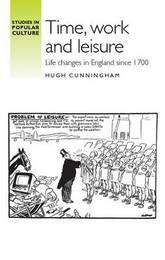
|
Time, work and leisure: Life changes in England since 1700
Hardback
Main Details
| Title |
Time, work and leisure: Life changes in England since 1700
|
| Authors and Contributors |
By (author) Hugh Cunningham
|
|
Series edited by Jeffrey Richards
|
| Series | Studies in Popular Culture |
|---|
| Physical Properties |
| Format:Hardback | | Pages:240 | | Dimensions(mm): Height 234,Width 156 |
|
| ISBN/Barcode |
9780719085208
|
| Classifications | Dewey:306.4812 |
|---|
| Audience | | Postgraduate, Research & Scholarly | |
|---|
| Edition |
UK ed.
|
|
Publishing Details |
| Publisher |
Manchester University Press
|
| Imprint |
Manchester University Press
|
| Publication Date |
1 April 2014 |
| Publication Country |
United Kingdom
|
Description
This book traces the history of the relationship between work and leisure, from the 'leisure preference' of male workers in the eighteenth century, through the increase in working hours in the later eighteenth and early nineteenth centuries, to their progressive decline from 1830 to 1970. It examines how trade union action was critical in achieving the decline; how class structured the experience of leisure; how male identity was shaped by both work and leisure; how, in a society that placed high value on work, a 'leisured class' was nevertheless at the apex of political and social power - until it became thought of as 'the idle rich'. Coinciding with the decline in working hours, two further tranches of time were marked out as properly without work: childhood and retirement. Accessible, wide-ranging and occasionally polemical, this book provides the first history of how we have imagined and used time.
Author Biography
Hugh Cunningham is Emeritus Professor of Social History at the University of Kent
ReviewsTime, Work and Leisure is a pleasure to read, and should find a wide audience, including undergraduate students and even policymakers. Cunningham strikes a good balance between descriptive narrative and a Thompsonian use of a wider range of primary sources, from poetry to first-hand narratives to employer screeds, workers' time-diaries, and government statistics. Moreover, he does an excellent job historically contextualizing present concerns about how we spend our time. -- Jamie Bronstein. Labour/Le Travail, Volume 76
|